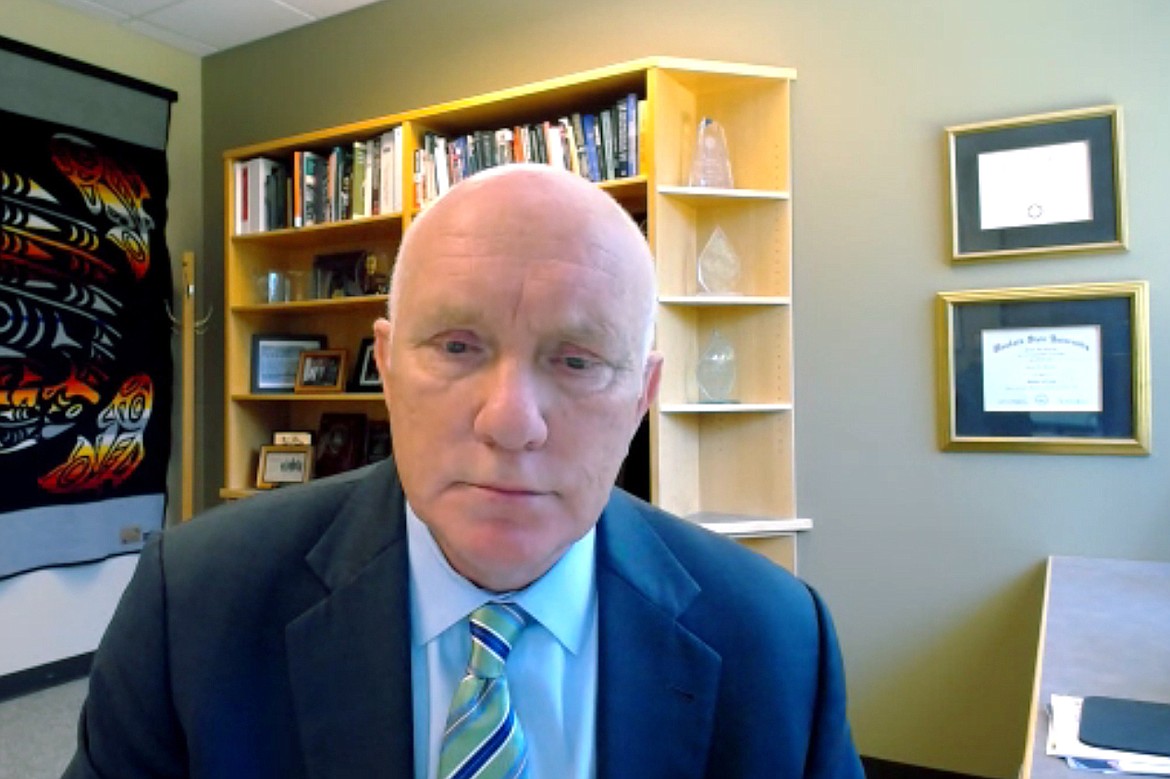Murders up, police staffing way down in Washington state
By GENE JOHNSON
Associated Press
SEATTLE — The number of murders, robberies, serious assaults and other violent crimes rose significantly in Washington last year while the number of officers available to respond to them continued to plummet, the head of the organization that collects the data said Wednesday.
The Washington Association of Sheriffs and Police Chiefs released its annual report on crime, finding that violent crime overall increased 12.3%.
Although the murder rate — 4 per 100,000 residents — was slightly higher in the late 1980s and early '90s, the number of murders — 325 — was the most since the the association started tracking the data in 1980. It was up from from 302 in 2020 and 201 before the pandemic in 2019; the national murder rate also soared in 2020.
Meanwhile there were 495 fewer police employed in the state, which already had the nation's fewest officers per capita, said Steve Strachan, the association's executive director. That left Washington with 10,736 full-time officers, a drop of 4.4%, to serve a population that rose 116,000 to more than 7.7 million.
Washington’s police staffing rate was 1.38 officers per 1,000 residents, well below the national average of 2.33 reported by the FBI. Washington would need almost 7,400 more officers to hit that mark, Strachan said.
“Nobody should be OK with where we are right now,” Strachan said during an online news conference. “Reduced staffing means — this is the most important point, really — less ability to provide justice for victims.”
Many police departments across the country, from Atlanta to Portland, Oregon, have struggled with staffing shortages prompted by retirements and resignations amid the pandemic and racial justice protests that made the agencies a target of budget cuts.
In Washington, some officers have also complained that police reform efforts passed by the Legislature in 2021 in response to the police murder of George Floyd, restricting when and how police can use force, went too far.
The remaining officers have been stretched thin — responding to one call after another, with less time for behavioral health outreach or follow-up investigation, Strachan said. It also makes it more difficult for police to de-escalate volatile situations, which can involve teaming up with other officers and slowing down how they respond.
That leads to burnout and further departures, he said.
Gov. Jay Inslee called the report “disturbing” but stressed that other states are facing similar issues with police staffing. He noted that the Washington Legislature had recently increased the pension for law enforcement officers and tweaked some of its police reform laws to ease officer concerns. He planned a news conference on Thursday to discuss further ways to improve officer recruitment, including by expanding the state's main police academy to make it more convenient for officers to be certified.
“We are doing things very actively to try to make this a more attractive profession ... but there is no secret that this has been a difficult time for all of us, including law enforcement,” Inslee said. “This defund-the-police movement, I don't agree with it. We need to have an approach that will give us an adequate degree of well-trained, accountable police officers, and we are going to do that in Washington state.”
The Seattle Police Department remains down 372 officers out of a force approved for more than 1,300. That’s hurt emergency response times, prompted the department to stop responding to low-priority calls and required officers to work overtime, hurting morale, according to Chief Adrian Diaz. Mayor Bruce Harrell this month announced a plan to hire 500 officers over the next five years, including signing bonuses of up to $30,000.
Republicans in Olympia were quick to blame the increase in violent crime and decrease in officers on Democrats' police reform measures, as well as on their response to a state Supreme Court ruling that struck down Washington's prohibition on simple drug possession. Democrats last year made possession of small amounts of drugs, even hard drugs like heroin, a misdemeanor, and they required police to divert a defendant’s first two offenses to treatment.
“It is no surprise that this chaos is a direct result of the flawed laws enacted by Democrats over the past two legislative sessions,” Sen. Chris Gildon, R-Puyallup, said in a written statement. “Their policies have created an open season for criminal activity.”
Despite the increase in violent crime, crime overall was actually down — thanks to a 74% drop in drug arrests and a 79% decrease in identity theft, which fell steeply in 2021 following a rash of pandemic-related unemployment fraud in 2020, the annual report said.
Leslie Cushman, of the Washington Coalition for Police Accountability, disputed the notion that a drop in police staffing would hurt the ability of officers to de-escalate, and she said that departments can rely more on behavioral health agencies for community outreach when necessary.
“Officers have been trained on de-escalation for decades. It is part of their critical decision making for their day-to-day job," she wrote in an email. "It’s good to see crime rates down and (I'm) happy that decriminalizing offenses factors in here. That should translate to a freeing up of resources.”
Among the other notable findings of the report were that hate crimes increased by about a quarter from 2020, to a total of 592 incidents, including 91 aggravated assaults. Auto thefts were also up by about a quarter, and vehicle part thefts — primarily catalytic converter thefts — doubled.

